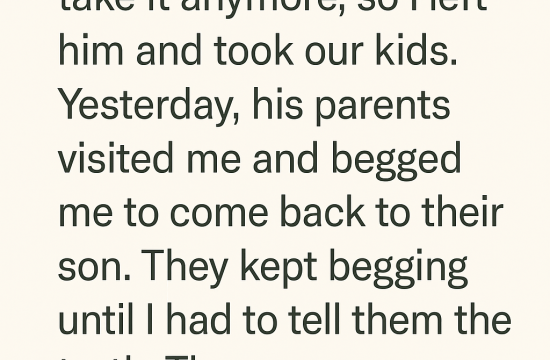Since my wife died, my ex-MIL started to view my daughter as a replacement. On the last visit to her house, my daughter came back unusually quiet, and she eventually admitted that her grandmother had been forcing her to call her “Mommy.”
At first, I thought maybe it was a misunderstanding. My daughter, Lila, was only seven. Kids sometimes get confused or exaggerate when they’re tired. But this time, she wasn’t being dramatic. She sat on the edge of her bed, twisting the hem of her shirt and avoiding my eyes.
“She said if I don’t call her Mommy, I won’t get dessert,” Lila whispered. “And she’ll tell you I was bad.”
My chest tightened. Something in her trembling voice told me this wasn’t a one-time slip.
I sat beside her and gently took her hand. “Sweetheart, you never have to call anyone Mommy except your real one. And she’s in heaven, watching over you. Okay?”
Lila nodded, but her eyes stayed downcast. That silence was heavier than words.
My wife, Sarah, had passed away two years earlier in a car accident. Even though she and I had divorced a year before that, we co-parented with respect. Her mother, Judy, however, never liked me. After Sarah’s death, she pushed to stay close to Lila, and I agreed. I thought more love in my daughter’s life could only help. But now… I wasn’t so sure.
The next weekend, I kept Lila home instead of sending her to Judy’s. When Judy called, I told her Lila had a cold. Judy’s response made me freeze.
“Tell my little girl I miss her. I hope she remembers who loves her the most.”
That night, I gently asked Lila if there was anything else her grandmother had said. Hesitant at first, she finally admitted more.
“She says you don’t know how to be a good daddy… because you didn’t love Mommy enough. She says if I live with her, I’ll feel more loved.”
The words cut like glass. This wasn’t love—it was manipulation.
I scheduled sessions with a child psychologist, needing professional eyes on the situation. After a few visits, the psychologist confirmed my fears.
“She feels torn between you and her grandmother,” the doctor explained. “She’s internalizing guilt, trying to protect both of you. That’s a lot for a child to carry.”
That was when I knew: I had to step in firmly.
When I told Judy we needed space, she snapped. “So now you’re turning her against me too? First Sarah, now Lila. You ruin everything.”
I didn’t rise to it. I just repeated: “Lila’s well-being comes first.” Then I ended the call.
For a few weeks, life settled. Lila laughed again. She hummed when she drew. She stopped asking, “What if I make Grandma mad?” before bed. I thought maybe we were moving forward.
But then the letter came. Judy had filed for grandparent visitation rights.
The case dragged on for months. I stayed steady—kept records, brought Lila to therapy, and never spoke badly about Judy in front of her. The court appointed a guardian ad litem to represent Lila’s interests. That’s when the darker truth surfaced.
Judy had made Lila try on Sarah’s old dresses, calling her by her mother’s name. She told her, “If something happens to your dad, you’ll live with me—like your mommy would’ve wanted.”
When the judge heard this, it was over. Judy’s visits were restricted to monthly supervised sessions at a neutral center.
It wasn’t easy, but it was safe. And Lila blossomed.
We built new routines—movie nights, pancakes on Sundays, long walks with her dog Max. Slowly, the shadows faded. A year later, I met Rita, a kind single mom from Lila’s school. She never pushed, never tried to replace anyone. When Lila finally whispered, “I like her. She doesn’t try to make me be someone else,” I knew healing had begun.
Over time, our little family grew. Rita’s son Jonah became like a brother to Lila, and laughter filled our home again. One night, Lila leaned on Rita and asked, “Can I call you something special? Not Mommy, just… something?” Rita smiled softly and told her she could choose whatever felt right. Lila decided on “Ree.”
It was her choice. Her voice. Her peace.
Years passed. Lila grew into a confident, thoughtful teen who never forgot her mom but also never felt trapped by her memory. On Sarah’s anniversaries, we released paper lanterns together, honoring her. One evening, Lila said, “Dad, I used to think loving someone new meant forgetting Mommy. But now I know I can do both.”
That’s when I knew she’d be okay. And so would I.
Looking back, I realized the hardest part wasn’t the court battles or family tension. It was learning to listen to my daughter—truly listen—and trust her voice.
To any parent: if your child says something that makes you pause, don’t dismiss it. Children may not always have the right words, but they always have the truth in their feelings. Protect it. Honor it.
Because real love doesn’t demand a title or steal a place. Real love waits. It respects. It heals.











